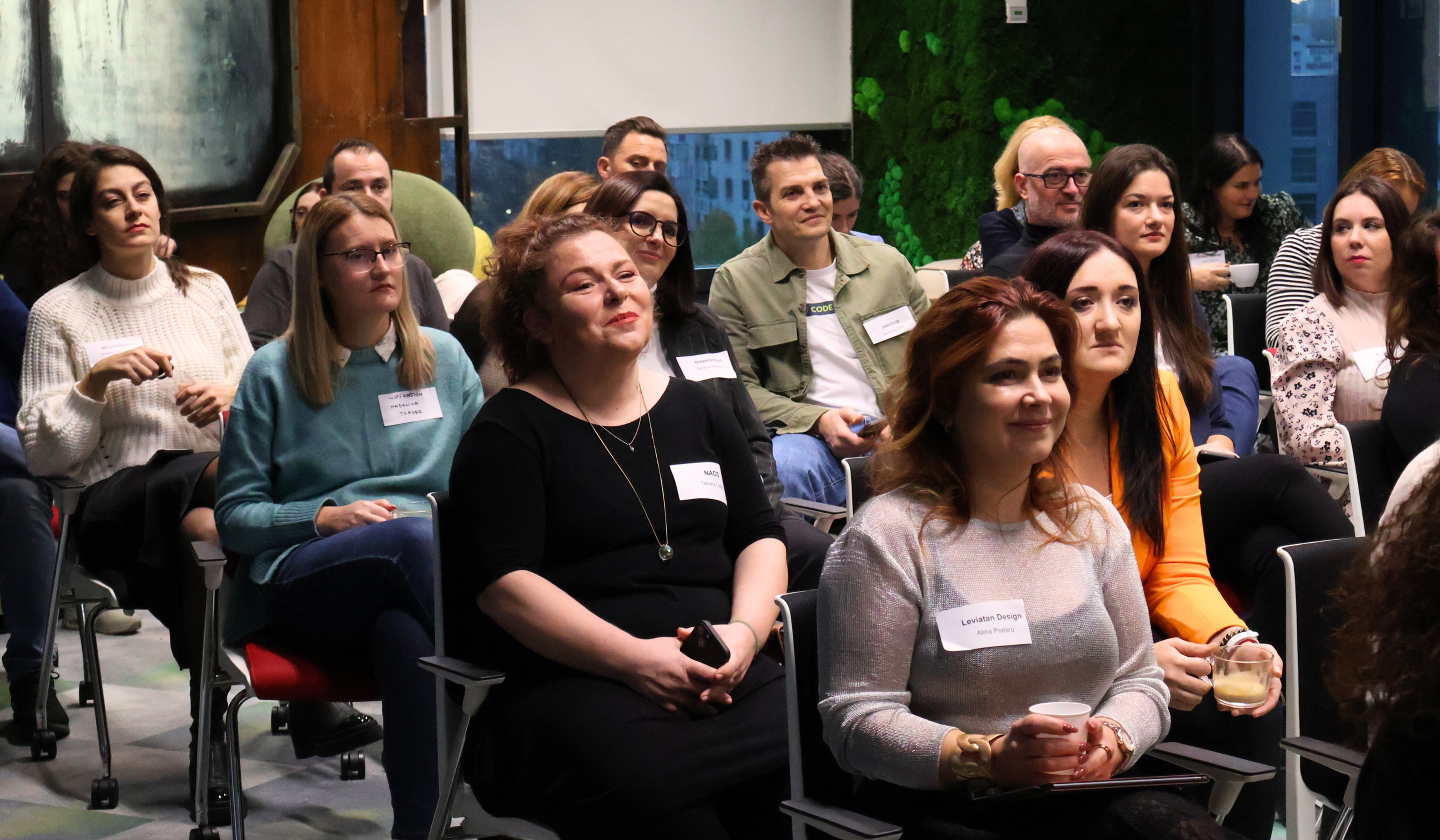SECTION
Balancing Growth and Values: Insights from Industry Leaders

Listen to this article:
On November 21, 2024, we hosted our sixth in-person event, which focused on cultivating a people-first culture that adapts and thrives as your company scales.
Our panel brought together three representatives from well-known companies that have continuous, sustainable growth with excellent results: Lucian Băltaru, CEO of Sameday Courier, Mihai Logofătu, CEO of Bittnet Group, and Florina Dobre, CEO of Bringo Romania.
The event's scope was to learn how they approach performance, what people's well-being means, how it is linked to organizational performance, and how to keep values alive in fast-growing companies.
Together with our panelists and moderator, Simona Lăpușan, our CEO and founder, we explored how rapid growth is a thrilling yet complex journey for any organization. Here are the key lessons we learned from our panelists' experiences:
Balancing growth and values: insights from the leaders
We started the event by asking our panelists how they manage the pressure for quick results without compromising the core values of their organizations. Although our panelists faced unique challenges, all of them have something in common: the need for clarity, alignment, and long-term vision in navigating rapid growth.
1. Refreshing values to match new realities
For Lucian, scaling a company to thousands of people across multiple countries required a shift in the core values. The company underwent a “refresh” of its principles to better reflect the current needs of both team members and investors.
The challenge was to balance short-term expectations from stakeholders with the longer-term aspirations of team members. In this context, maintaining clarity around goals and communicating decisions in a way that aligned everyone toward a common purpose was crucial.
💡 Key takeaway: Updating core values is necessary to stay relevant as your organization evolves. Transparency and alignment are crucial to keeping motivation and engagement high during change.
 Lucian Băltaru, Sameday Courier
Lucian Băltaru, Sameday Courier
2. When organizational culture comes first
Mihai's experience highlighted the need to put culture first, especially when managing growth through acquisitions and the added responsibility of being a publicly listed company. Early in the organization's journey, the values reflected the founders' vision, but as the company expanded, those values evolved to accommodate a larger and more diverse team.
A crucial turning point for Bittnet Group came when they had to let go of a high-performing employee who was detrimental to the company culture. This decision was a powerful example for middle managers—on one hand, it reinforced the importance of prioritizing culture, and on the other hand, it encouraged other managers to do the same.
Mihai also highlighted indicators of a healthy organizational culture, such as new hires coming through recommendations or former employees returning, both of which signal trust in the company.
To support this cultural evolution, the company introduced a dedicated People and Culture team to ensure people's needs remain at the forefront.
💡 Key takeaway: Prioritizing cultural alignment over individual performance is key to sustainable growth and empowers leaders to uphold organizational values.
 Mihai Logofătu, Bittnet Group
Mihai Logofătu, Bittnet Group
3. Balancing immediate results with long-term vision
Florina shared the challenge of client-facing roles. You have to balance the pressure for immediate results with the broader goal of cultivating a healthy company culture. She emphasized the importance of clarity over objectives, ensuring that everyone understands their impact in the organization.
She further pointed out the importance of healthy leadership practices, such as providing constant feedback, recognizing achievements, and shielding the team from unnecessary stress.
Middle managers should act as buffers between external pressures and their teams. This allows team members the mental space needed to be creative and autonomous.
💡 Key takeaway: Leaders must protect their teams from external stress, enabling them to focus on creativity and innovation while staying aligned with organizational values.

Florina Dobre, Bringo Romania
Performance: beyond metrics
When discussing performance, we often translate it into indicators and targets. But what does 'true' performance mean to leaders, and how do they ensure it aligns with both employee well-being and business objectives?
For Lucian, it's about consistent progress toward ambitious goals, even if results take longer. Supporting people through setbacks and emphasizing their impact fosters a culture of ambition and pride.
Mihai highlighted the importance of consistency and adaptability. In his view, performance is about evolving with the market while staying true to your core values. A strong company culture is crucial to maintaining this balance, ensuring long-term success even under pressure.
Florina added that performance must be supported by a well-structured organization, adapted to the industry's pace. In rapidly evolving sectors like digital commerce, revisiting and adjusting organizational structures annually can help teams stay agile. Managers play a pivotal role here—they know their team members' needs best and can tailor support accordingly. Having a manager who inspires trust and provides clarity makes objectives feel more achievable.
Clarity: the foundation of success
In fast-growing organizations, clarity is essential for aligning teams and maintaining focus. For Lucian, setting 2-3 clear and measurable KPIs ensures simplicity and alignment. Once decisions are made, leaders must clearly communicate them to their teams, fostering understanding and buy-in at every level.
Mihai highlighted the importance of dedicated workshops to establish alignment across the company. Inspired by corporate models, these sessions provide an opportunity to reflect on past performance, define future priorities, and connect teams across departments.
Florina emphasized the need to personalize objectives and help people understand their impact on the organization's success. Leaders can build confidence and engagement by breaking down broader goals into actionable, role-specific contributions, even in rapidly changing environments.
Looking ahead
The Culture Equation event offered plenty of insights for any organization navigating growth and cultural transformation. Whether you’re revisiting your values, prioritizing company culture, or redefining performance, the lessons shared by our speakers are a testament to the power of intentional leadership.
At Mirro, we’re committed to helping leaders create better workplaces for their teams. Be sure to watch for our upcoming events, which will provide vital guidance and enable attendees to thrive in today’s modern workplace. In the meantime, follow us on LinkedIn to stay updated and be the first to learn about our next event.
Which of these insights resonated with you most? We’d love to hear your thoughts—let’s keep the conversation going, and we hope to see you at our next event!






